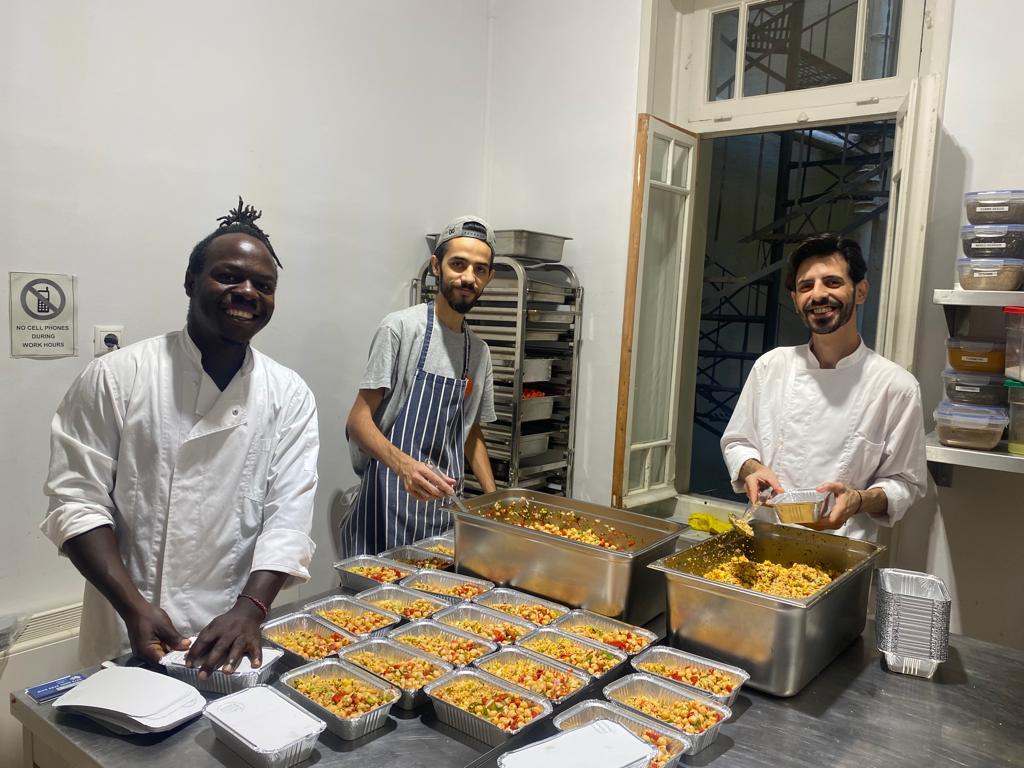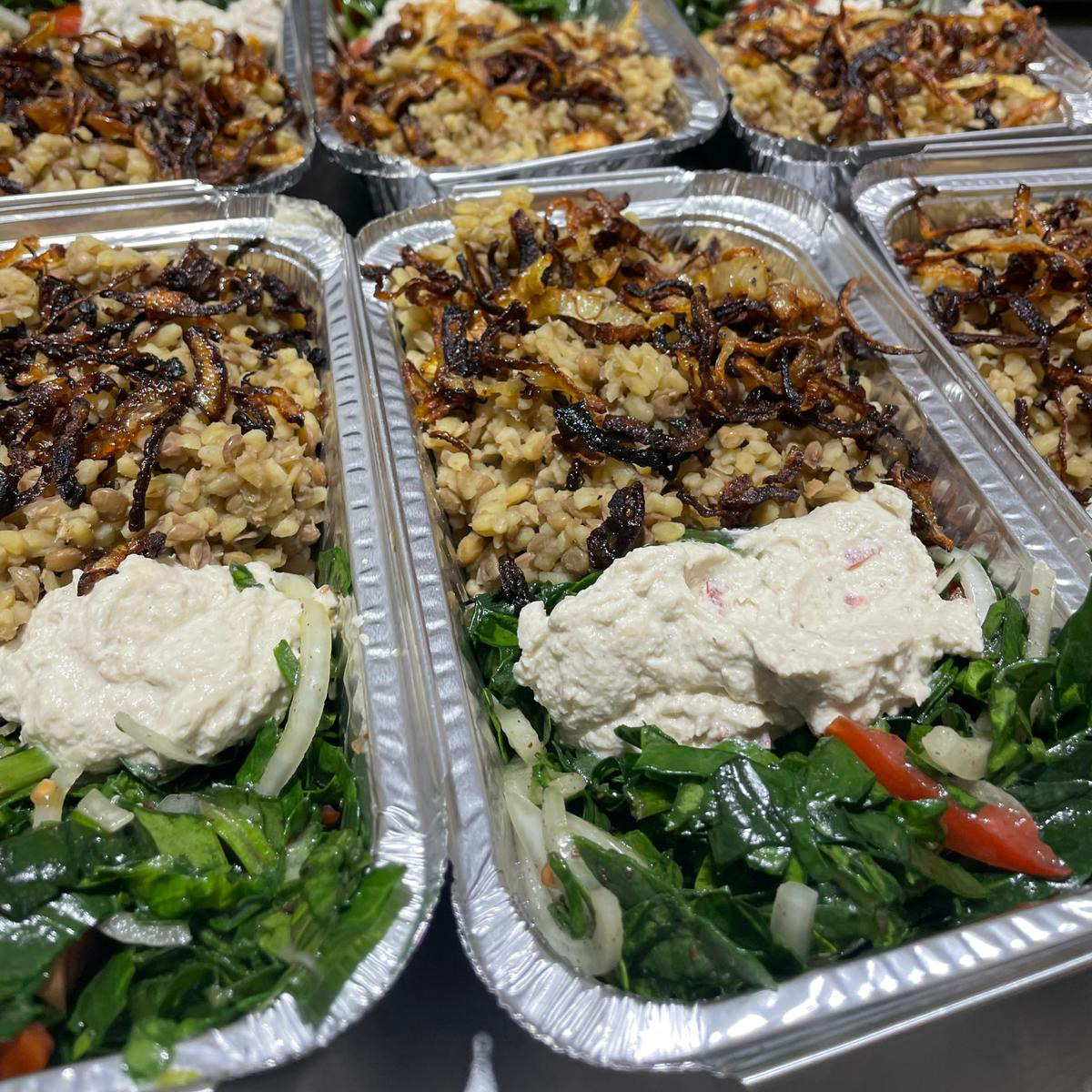‘Make mental health for all a global priority’
We are delighted to have been mentioned in the Europe Must Act Newsletter on mental health.
Europe Must Act began as a call for change from grassroots NGOs working in Greece, with aims rooted in ethical and humanitarian principles. It is a call and a belief that a fair and humane migration policy is possible, that through collective action we can build a better world.
Saffron Kitchen Project "currently cooks over 1,000 meals a week, with the aim of reducing food instability and providing this basic need for refugees and vulnerable groups in Athens. Providing free culinary courses as well as employment opportunities for refugees, SKP not only addresses adequate nutrition as a key factor to physical and mental health, but also provides opportunity for social inclusion and integration, and practical skills to increase prospects of employment - all sources of stress and uncertainty for adult refugees."

Read the full article below...
Europe Must Act Newsletter
Mental health as a global priority & positive trends in refugee mental health care
15.10.2022
Dear Readers,
‘Make mental health for all a global priority’; this is the theme that was announced on World Mental Health Day on Monday of this past week.
Our last newsletter focused on the role of hope as a driver for change in the face of the everyday events we experience, hear, and read about. As Thomas Coombes said so eloquently during last week’s webinar, hope is the belief that tomorrow can be made better. (If you missed the live webinar, you can still watch it here!)
We can applaud the existence of a day dedicated to mental health education, awareness and advocacy. And yet, we can also acknowledge that mental health care should be prioritized as a human need every day. In the context of conflict, displacement, and the asylum system that exists today, people’s wellbeing are undeniably affected, in different ways and to different extents. And so, today’s newsletter will be addressing the idea that mental health and psychosocial support should be treated as a priority response in the context of displacement, as well as acknowledging the progress that has already been made in this respect.
Mental health in our day-to-day lives
Mental health has widespread effects on different aspects of life, encompassing “emotional, psychological, and social well-being”. Maintaining good mental health can make space for higher levels of productivity, creativity, as well as facilitate more fulfilling social connections - while distress and unacknowledged mental health conditions can similarly negatively affect other areas of one’s life.
The COVID-19 pandemic field saw a rise in short and long term stresses for many, creating what has been coined as a ‘global crisis for mental health’. Children have reported higher levels of mental health concerns, mostly as a result of the pandemic and the shortage of mental health professionals who specialize in children and adolescents. Burnout and stress are on the rise for people of all professions, with teachers and healthcare workers especially prone to experience these same feelings they support others through. Simultaneously, the conversation around mental health as a key and undeniable aspect of one’s overall well-being has also been allowed to take up more space, allowing for positive trends as well. For example, investments into mental health apps have increased, allowing people greater access to a wider variety of services, allowing those unable to physically go for treatment to get the support they need. Increasing numbers of public figures are also sharing their struggles with mental health; the hope is that stigma around this topic can be reduced, and allow for more people to speak up and get the support they need.
Displacement & mental wellbeing
The additional and undeniable stresses that people on the move experience make mental health a core topic to consider in refugee protection and response programs. The Mental Health and Psychosocial Support (MHPSS), or Psychosocial Intervention is a field that was developed substantially in the 1990s and that has continued to develop since.
“ The psychological and social impacts of emergencies may be acute in the short term, but they can also undermine the long-term mental health and psychosocial well-being of the affected population. These impacts may threaten peace, human rights and development. One of the priorities in emergencies is thus to protect and improve people’s mental health and psychosocial well-being. achieving this priority requires coordinated action among all government and non- government humanitarian actors. ”
- IASC Guidelines on MHPSS in Emergency Settings, 2007
Conflict, persecution, natural disasters; the journey in the search of safety; the uncertainty of the asylum process & the often difficult and inhumane living conditions; the long-term challenges of integration… These are some of the issues that refugees and asylum seekers face, and that can affect any person’s wellbeing. The World Health Organization also lists “partial or unclear entitlements, limited access, lack of interpreters and cultural mediators and fewer financial resources” as additional obstacles to effective and adequate health care for refugee populations.
The differences in mental health needs at these different stages, and the deeply individual emotional and psychosocial responses that people may experience make mental health a complex issue - and one that we hope will continue to be developed in humanitarian response programs and projects.
Mental health response: Projects addressing refugee wellbeing in Greece
While the general response to refugee health differs widely across European countries, many NGOs are working to address refugees’ mental and physical health. In Greece, various projects exist, addressing MHPS needs directly and indirectly. Here, we mention three projects who, while doing very different work, address different areas vital to overall wellbeing.
Yoga and Sport with Refugees (Lesvos, Athens, Paris)
Their goal is to facilitate well-being, generate opportunities, and integrate refugees into society through sports. Yoga, climbing, martial arts, field sports, running, swimming, dancing, among other activities - the common factor being this one:
the belief that sports can create a sense of community, encourage integration, foster leadership skills, and create a potential pathway for employment.
Saffron Kitchen Project (Athens)
“ A lack of access to daily nutrition creates stress in both the body and the mind.”

The organization currently cooks over 1,000 meals a week, with the aim of reducing food instability and providing this basic need for refugees and vulnerable groups in Athens. Providing free culinary courses as well as employment opportunities for refugees, SKP not only addresses adequate nutrition as a key factor to physical and mental health, but also provides opportunity for social inclusion and integration, and practical skills to increase prospects of employment - all sources of stress and uncertainty for adult refugees.
"The job opportunities we give allow people like our Head Chef to support himself doing a job that he feels passionate about, working full-time gives Adel security and independence. For the first time since coming to Greece, he is able to afford housing and he has benefits that give him peace of mind. He says, “I feel less stress now and I am able to socialize and live a fuller and more integrated life in Europe.” With our vocational training programmes we hope to be able to offer similar opportunities to other refugees looking for work in Greece."
Medical Volunteers International
(Athens, Thessaloniki, Lesvos, Bosnia, Ukraine)
Addressing primarily physical health, MVI’s work is a response to the lack of access to health care for refugees and vulnerable people. A ‘mobile’ healthcare service, MVI provides free medical care to approximately 2500 people per month in Greece, and involves refugee communities in interpretation and translation in order to ensure effective communication. MVI’s work to improve the physical health of the refugees removes inability to access treatment as a source of distress, and in turn can result in improved mental health and overall well-being.